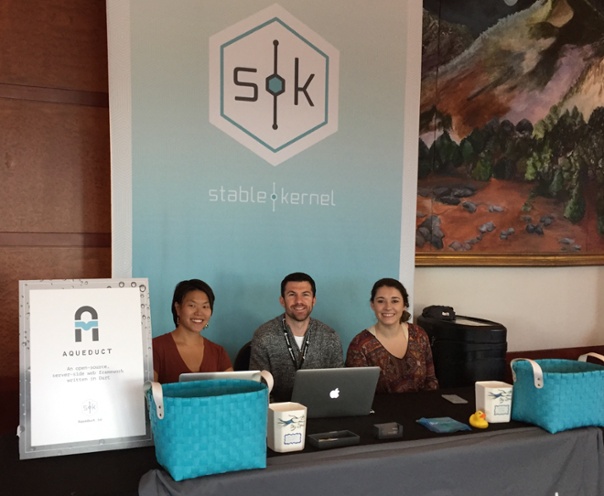On one of your company’s walls, in an employee handbook, or in a PowerPoint deck on someone’s hard drive there is probably a list of your company’s values. Company values that someone was feeling passionate about as they were selecting and articulating them. Values that when embraced by employees result in increased employee satisfaction, client satisfaction and a more robust bottom line.
But do you know what those values are?
According to the 2015 Employee Engagement Report from Deloitte, only 42% of us do. And it stands to reason that even fewer have been encouraged to internalize the values and apply them deliberately. This leaves me feeling deflated because those values, when deeply socialized and put into daily practice by everyone in an organization, can do exactly what they were meant to: provide valuable direction for shaping a forward-looking company culture that engages and empowers employees to move the company forward.
How Your Company Values Impact Employee Satisfaction
The value of employee satisfaction is a relatively new benchmark. In fact, if you are old enough to have a working memory of workplace culture in the 1980s the term “forced ranking” probably means something to you (and may even cause you to curl up protectively into the fetal position). For those unfamiliar with the term, it was coined by Jack Welch and enthusiastically adopted by many companies as a system to force-rank employees. David Mamet’s “Glengary Glen Ross” brilliantly and brutally animates Welch’s approach in the following diatribe delivered by the character Blake to a sales team:
The good news is – you’re fired. The bad news is – you’ve got, all of you’ve got just one week to regain your jobs starting with tonight. Starting with tonight’s sit. Oh? Have I got your attention now? Good. “Cause we’re adding a little something to this month’s sales contest. As you all know first prize is a Cadillac El Dorado. Anyone wanna see second prize? Second prize is a set of steak knives. Third prize is you’re fired. Get the picture? You laughing now? You got leads. Mitch and Murray paid good money, get their names to sell them, you can’t close the leads you’re given you can’t close shit. You ARE shit. Hit the bricks, pal, and beat it ’cause you are going OUT.
Yikes. I sure am glad that leadership-style pendulum has swung!
So where are we now? In a Wall Street Journal article proclaiming “It’s Official: Forced Ranking is Dead” Lisa Barry, a Global Talent, Performance and Rewards leader for Deloitte and Touche explains that forced ranking was “originally conceived at the turn of the 20th century to measure the performance of factory workers and manual laborers.” Like the Welch-following companies of the 1980s, today’s successful businesses are sustained by results. What’s changed is that today’s results are more closely tied to service and knowledge-based work in which an employee’s performance “is largely driven by their skills, attitude, and ability to relate to others.” And that, my friends, is where our company values become an important foundation for our success.
At stable|kernel, we take our company values seriously. In fact, we’re halfway through our “Year of Values” curriculum in which we, as a company, deeply explore what our four company values mean and we collaborate on how we can practice them within the office, with our clients and even outside of work. The first value we’ve explored, Integrity ALWAYS, is what we believe will be the cornerstone for our sustainable growth. We demonstrate integrity by doing what we say we’re going to do and by doing the right thing even when nobody is watching. When we act with integrity, we earn trust.
 Kyle Brooks, our representative for Integrity Always
Kyle Brooks, our representative for Integrity Always
I had the pleasure of attending the Great Places to Work Conference in Austin, TX earlier this month and was reassured by the research presented that our focus on integrity has put us on the right track. Ed Frauenheim, Director of Research & Content for Great Places to Work, shared that in their 25 years of research in quantifying what makes a great place to work, trust was the number one driver of employee satisfaction.
In our experience, once employees trust leadership and leadership trusts the employees, almost anything is possible. It allows our employees to innovate and find meaning in the work they do every day, it eliminates micromanagement, and it allows us to create a community of unprecedented work-life balance.
Related: stable|kernel’s Words to Live By
How Your Company Values Impact Client Satisfaction
At stable|kernel, we challenge ourselves to take an active role in learning about the complex problems that matter to both our clients and their end users in order to share and build smart, empathetic solutions. With this focus, we strive to become an invaluable partner. This disposition is supported by our focus on our other core values: r-e-s-p-e-c-t (you have to channel your inner Aretha when saying it!), We Stay Hungry, and We Learn and We Share.
For the last three months, we’ve been working through the field trips, professional and personal challenges, talks, books and films that are part of our R-E-S-P-E-C-T curriculum, identifying concrete behaviors we can practice that show respect for our clients and the problems we are helping them solve.
In November we will delve into the exploration of our third value: “We Stay Hungry.” What this means for our clients is that we are always working to up our game, solve problems smarter and anticipate what challenges and opportunities our clients and their end users may face. This value also signifies our appreciation for the work we must consistently do in order to attract and retain the very best clients. We know that every line of code matters.
Our fourth value is “We Learn & We Share.” While we won’t officially tackle this curriculum until next winter, the practice of the value is alive and well in our office. It manifests itself in the questions we ask our clients, the end user testing we perform, the blogs we write, the lunch and learns that fill our calendar and the conferences we attend, sponsor and where we present. An exciting result of our learn & share value is the introduction to stable|kernel’s new Aqueduct framework. In order to best solve the challenges of some of our clients, we developed this framework and are pleased to now share it with the developer community.
 Alexandra, Joe (CEO), and Erin launching Aqueduct at the Connect.Tech conference
Alexandra, Joe (CEO), and Erin launching Aqueduct at the Connect.Tech conference
How Your Company Values Impact Your Bottom Line
In a service and knowledge-based industry, great places to work spend a lot of time and money crafting and executing their learning and culture programs. From a financial picture, is there proof that it is worth it?
Yes. According to “The Trust Mindset” research presented by Ed Frauenheim and Julian Lute at the Austin conference, high trust organizations experience half the turnover of IT companies who register lower trust scores (9% versus 18% in IT). In a knowledge-based industry, retention is a huge driver of potential company savings.
At stable|kernel, we make a significant investment in the continued education of our employees. So what happens if they take all of that new knowledge and leave? Frankly, we know that in the new economy some people will choose to leave. But as the business adage goes, “Q: What happens if we train them and they leave? A: What happens if we don’t and they stay?” With trust and employee satisfaction being among the highest drivers of innovation, the potential bottom line gains to investing in values programs is virtually limitless.
Every company’s core values will be unique, but if you’re not sure what your company values or if you don’t see those values being put into practice on a daily basis, do yourself, your colleagues, your clients and your company the favor: ask about them and argue for the value they will bring to all.
